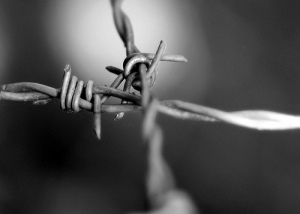 As a writer, I’ve always dreamed of being invited to speak at the wonderful Hay on Wye book festival. Earlier this year, I received an email out of the blue. My dream had come true, albeit in a very unusual way. The email invited me to speak at the “Hay in the Parc” festival. I had heard of Hay in the Parc, and had always imagined it to be the section of the Hay Festival that takes place in a wonderful park, with everyone sitting around drinking Pimms, eating canapés, and enjoying the sunshine as they listen to famous authors reciting prose and poetry. However, this e-mail informed me that this was far from being the case. The invite was, in fact, far more challenging and interesting. The “Parc” in question was no Hyde Park or Roath Park, but was instead Parc prison, the secure category B jail in Bridgend.
As a writer, I’ve always dreamed of being invited to speak at the wonderful Hay on Wye book festival. Earlier this year, I received an email out of the blue. My dream had come true, albeit in a very unusual way. The email invited me to speak at the “Hay in the Parc” festival. I had heard of Hay in the Parc, and had always imagined it to be the section of the Hay Festival that takes place in a wonderful park, with everyone sitting around drinking Pimms, eating canapés, and enjoying the sunshine as they listen to famous authors reciting prose and poetry. However, this e-mail informed me that this was far from being the case. The invite was, in fact, far more challenging and interesting. The “Parc” in question was no Hyde Park or Roath Park, but was instead Parc prison, the secure category B jail in Bridgend.
 Hay in the Parc is a sister literary festival to the principal festival in Hay. Its aim is to help inspire prisoners and, ultimately, to change their lives, especially as the majority of whom (according to a recent article in The Guardian) have a reading age below that of a 10-year-old. The festival offers opportunities for prisoners to engage with authors and to attend creative writing classes, and, since it began in 2008, it has touched the lives of around 2,000 prisoners.
Hay in the Parc is a sister literary festival to the principal festival in Hay. Its aim is to help inspire prisoners and, ultimately, to change their lives, especially as the majority of whom (according to a recent article in The Guardian) have a reading age below that of a 10-year-old. The festival offers opportunities for prisoners to engage with authors and to attend creative writing classes, and, since it began in 2008, it has touched the lives of around 2,000 prisoners.
 My own visit turned out to be quite an experience. Having written a book on compassion, I thought it would be easy to face this group of prisoners. As I sat in the prison chapel beforehand, the chaplain took the opportunity to brief me (in a non-specific way) of the type of crimes for which prisoners in Parc were being detained. As I talked to her, it dawned on me that many of them were not in prison for speeding offences or petty theft, but, rather, for crimes that I found completely abhorrent. I began to think about the victims of their crimes and it led me to feel angry and upset. I realize now that I was echoing the very attitudes that this group of people must fear they will face on being released back into our community. Writing about (and preaching about) seeing the face of Christ in everyone with whom we come into contact is easy. Living that out in our daily lives is much harder. Yet, once the prisoners were in the room, their humanity, their engagement, their humour, their humility, and their sense of hope, drew me a little way down the path of seeing them as God sees them.
My own visit turned out to be quite an experience. Having written a book on compassion, I thought it would be easy to face this group of prisoners. As I sat in the prison chapel beforehand, the chaplain took the opportunity to brief me (in a non-specific way) of the type of crimes for which prisoners in Parc were being detained. As I talked to her, it dawned on me that many of them were not in prison for speeding offences or petty theft, but, rather, for crimes that I found completely abhorrent. I began to think about the victims of their crimes and it led me to feel angry and upset. I realize now that I was echoing the very attitudes that this group of people must fear they will face on being released back into our community. Writing about (and preaching about) seeing the face of Christ in everyone with whom we come into contact is easy. Living that out in our daily lives is much harder. Yet, once the prisoners were in the room, their humanity, their engagement, their humour, their humility, and their sense of hope, drew me a little way down the path of seeing them as God sees them.

In talking with the prisoners about suffering, the theme of my book Finding Hope and Meaning in Suffering that many had read as part of their prison book group, helped me realize the deep pain and suffering each one of them had been through, either before their crime or since their conviction. So much so that I learnt that these prisoners contributed to a moving collection of poetry and prose, entitled “Windows: Christian Writings from HMP Parc”. Throughout the book, their words reflect the sense of abandonment, loneliness, and alienation that they feel. As one of the contributors candidly wrote:
 “It started like any normal day, but this was the day I died. Yes, I said died, well at the time it felt like I had just died. I no longer had a first name, I was given a number and sat in a room that felt so cold and dark, but looking at the clock on the wall it was saying 2pm, but to me time meant nothing. I had just lost my life, my family, everything I own… I would sit on my bed reflecting on who I was and what I had done before coming to prison and how much better it would be to kill myself; this hell would end. I would close my eyes and I was back home with my family and it would be just a normal day, the wife doing wifely things and the kids just being kids. Then I would open my eyes and I was back in this cold cell that I call hell” (by ‘Will’)
“It started like any normal day, but this was the day I died. Yes, I said died, well at the time it felt like I had just died. I no longer had a first name, I was given a number and sat in a room that felt so cold and dark, but looking at the clock on the wall it was saying 2pm, but to me time meant nothing. I had just lost my life, my family, everything I own… I would sit on my bed reflecting on who I was and what I had done before coming to prison and how much better it would be to kill myself; this hell would end. I would close my eyes and I was back home with my family and it would be just a normal day, the wife doing wifely things and the kids just being kids. Then I would open my eyes and I was back in this cold cell that I call hell” (by ‘Will’)
In the foreword to this book, Archbishop Barry Morgan suggests that these prisoners have grasped the essence of the Christian gospel in their writing – that God loves us, unconditionally without any strings attached. On Prison Sunday, with churches across the UK remembering those affected by prison, this is the very message that Christians should be shouting from the rooftops and over barbed wire – God loves all of us, unconditionally without any strings attached.
 In the illustrated version of Philip Yancey‘s book What’s so Amazing about Grace?, there is one page where the only words printed are “the one God loves”, and, above that, is a small square of mirrored paper, where we look directly at ourselves. Powerfully, as you turn the next page, the words “like me” are printed and, above them, we see a big picture of Timothy McVeigh, the Oklahoma bomber who killed over 160 people. I know that I am loved by God, just as he loves you and he loves all the victims of crime, who certainly need our complete support and care. But the radical thing about God is that he also loves those jailed in Parc Prison and he loves the prisoners in other jails worldwide. Likewise, he loves the families and friends of prisoners whose lives are often torn apart at their conviction.
In the illustrated version of Philip Yancey‘s book What’s so Amazing about Grace?, there is one page where the only words printed are “the one God loves”, and, above that, is a small square of mirrored paper, where we look directly at ourselves. Powerfully, as you turn the next page, the words “like me” are printed and, above them, we see a big picture of Timothy McVeigh, the Oklahoma bomber who killed over 160 people. I know that I am loved by God, just as he loves you and he loves all the victims of crime, who certainly need our complete support and care. But the radical thing about God is that he also loves those jailed in Parc Prison and he loves the prisoners in other jails worldwide. Likewise, he loves the families and friends of prisoners whose lives are often torn apart at their conviction.
It’s true that God wants people to change, but God’s love will always come before any action on their part. There are no conditions to God’s love. He does not say “change, and then I will love you”. He loves us anyway in the hope that we will, some day, want to change. Whatever we do, whatever we think, whatever we say, whoever we are, he loves us. That’s the scandal of God’s gracious love. That’s the most difficult thing to accept about God’s love. But that’s also the most unique and beautiful thing about God’s love.

Most of us will find that hugely challenging, especially when we consider heinous crimes and notorious criminals. Personally, I certainly find it hard to comprehend. But this is not about me, and it’s not about what I feel. It’s not about you, and it’s not about what you feel. It’s about God, and it’s about how he feels. Nothing or no one is beyond his love. This is the reason why one prisoner could write these powerful and peaceful words at the end of his contribution to Parc Prison’s book:
“As I sat in the chapel listening to what was being said something happened to me. I started not to feel alone. This guy who was talking seemed like he was talking to me, even though the room was filled with other prisoners. It felt like he was just telling me a story about a bloke called Jesus. After chapel, I went back to my cell from hell, but this time it felt different. It was the same cell, but it did not feel so cold and I never felt like I was by myself again” (by ‘Will’)
See also:
“It could have been me”: Prison and Compassion
Crime and Compassion: Does Mick Philpott Deserve any Compassion?




